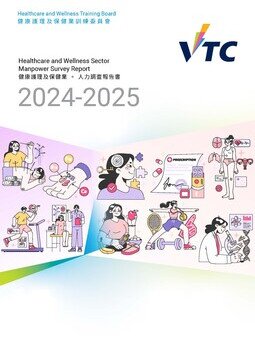Recommendation
Training Needs
- Hairdressing Salon -
1st
Hair Care & Scalp Care
2nd
Chemical Knowledge & Skills (e.g., Perming & Colouring)
3rd
Product Knowledge (e.g., product formulation & ingredients)
Training Needs
- Beauty Centre/ Health Centre & Spa -
1st
Beauty Care & Body Care (Product & Equipment Application)
2nd
Beauty Health Care (Product & Equipment Application)
3rd
Product Knowledge (e.g., product formulation & ingredients)
Training Needs
- Nail Salons -
1st
Communication & Interpersonal Abilities
2nd
Customers Services & Complaint Handling
3rd
Product Knowledge (e.g., product formulation & ingredients)
Training Needs
- Cosmetic Product Company - Wholesale, I/E -
1st
Customers Services & Complaint Handling
2nd
Communication & Interpersonal Abilities
3rd
Problem Solving Abilities
Training Needs
- Cosmetic Product Company - Retail -
1st
Customers Services & Complaint Handling
2nd
Communication & Interpersonal Abilities
3rd
Product Knowledge (e.g., product formulation & ingredients)
Training Needs
- School (Beauty & Hairdressing / Make-up & Nail) -
1st
Strategic Management
2nd
Store Operations Management
3rd
HR Management / Beauty Care & Body Care (Product & Equipment Application) / Product Knowledge (e.g., product formulation & ingredients) / Multi-languages
- Continuous Optimisation of Local and Human Resources as well as Manpower Development Policies
To alleviate the manpower shortage in various industries, the government has launched the “Enhanced Supplementary Labour Scheme”, covering more occupations in additional industries (including the hairdressing industry). To ensure an adequate local workforce and enhance the quality of service in Hong Kong, it is suggested that the government further reviews and amends the regulations on relevant import labour policies to enhance the policy’s effectiveness.
With the Government’s relaxation of the "continuous contract" requirement (commonly known as “4-18”) under the Employment Ordinance and the proposed amendments to "4-68", it will make it easier for more employees with shorter working hours to enjoy comprehensive employment protection and benefits, thus attracting more people to enter the labor market. It is recommended that the Government listens to the opinions of the beauty care and hairdressing industries to understand the latest work patterns and situations of part-time employees or freelancers.
- Promotion of Vocational and Professional Education and Training (VPET)
Leverage the "School-Business Partnership Program" platform to further promote the VPET to secondary school students, parents, and teachers, providing comprehensive information on relevant occupations fields.
Promote training institutions in developing and adopting “Credit Accumulation and Transfer” (CAT) mechanism to avoid any repetition of learning by students and support lifelong learning effectively. Through CAT, students can pursue further study in different locations, learning environments, and at time frame, thereby obtaining recognised qualifications and personalised credentials. Such diverse types of learning are flexible and could be tailor-made to attract young people to join the industries for development, helping the prevention of talent drain.
- Assisting the Industries in Promoting a Positive and Professional Image
- Strengthen the collaboration with industries/companies to jointly promote and publicise the positive and professional image of the beauty care and hairdressing industries and their practitioners, e.g., enhancing employees’ professionalism and overall service quality of the industries.
- Developing Flexible Recruitment Strategies and Human Resource Development Plans to Attract Talent
Formulate flexible recruitment strategies, e.g., offering remunerative packages and recruiting middle-aged individuals back into the workforce to expand the talent pool.
Formulate human resource development plans, e.g., (1) providing clear career development paths and promotion opportunities; (2) allocating resources to promote and encourage employees to pursue continuous learning and seek professional development; (3) offering salary increases/ bonuses for employees who have obtained additional professional qualifications; (4) arranging flexible work options and (5) enhancing communication between employees at all levels.
- Cultivating Talent with Digital Skills/Information Technology Skills
- With the rapid advancement of digitalisation and technology, employers should actively enhance employees’ digital skills / information technology skills by providing appropriate training programmes, enabling them to better grasp digital transformation and utilise digital/information technology tools and platforms. It can ensure that they are equipped with relevant expertise needed in the evolving landscape and assist in sustainable business development.
Strengthening Industry-School Partnership to Promote VPET
To address the manpower shortage and skills gap, it is crucial to establish a strong partnership between the beauty care and hairdressing industries as well as training institutions. Both parties should design a comprehensive training mechanism and establish a clear career and qualification pathway.
Utilising Government Resources in the Development of Industries’ Sustainability and Talent
Encourage the industries to actively utilise the government’s measures to assist in the sustainable development of the industries as well as the expansion of talent pool, e.g., (i) Digital Transformation Support Pilot Scheme; (ii) Principal Moratorium Arrangement; (iii) BUD Special Fund Scheme; and (iv) New Industrialisation and Technology Training Scheme.Encourage the industries to actively utilise the government’s measures to assist in the sustainable development of the industries as well as the expansion of talent pool, e.g., (i) Digital Transformation Support Pilot Scheme; (ii) Principal Moratorium Arrangement; (iii) BUD Special Fund Scheme; and (iv) New Industrialisation and Technology Training Scheme.
- Actively Equip Themselves to Enhance Trade-Specific Skills and Soft Skills
Employees should continuously enhance the trade-specific and soft skills to actively equip themselves and strengthen their competitiveness. Key trade specific and soft skills are listed as follows:
- Trade-specific skills: Knowledge of product formulations and ingredients, beauty and body care (products and equipment).
- Soft skills: Customer service and complaint handling, communication and interpersonal skills, store operation management, problem-solving abilities, and human resource management.
- Making Good Use of Government Resources to Upskill and Reskill
- Employees should make good use of government resources to enhance current skills and acquire emerging skills to stay abreast of industry trends and explore career development pathways, e.g., taking the "One Examination, Multiple Certifications" on beauty care and hairdressing by VTC, and enrolling in the courses provided by the Employees Retraining Board.
- Offering Diversified Training Options
- After the pandemic, there has been a severe manpower shortage in the industries. Training institutions should be responsive and flexible to provide diverse training options.
- Enabling Students to Understand Industries’ Operations
- Work closely with the industries to organise the activities to students such as (i) industry briefing to share the industries’ development trends and prospects; (ii) corporate visits to showcase local business achievements; (iii) alumni dialogues to understand career paths and prospects; and (iv) provision of internship and practical opportunities to understand the actual work environments, employees’ job roles, and skill requirements, thereby arousing their interests in joining the beauty care and hairdressing industries.
Develop Early Life and Career Planning for Students
- Training institutions should join hands with the industries, utilise “Life Planning Information Website” to plan and organise activities to assist students in setting goals in various stages of their lifetime. Comprehensive career planning enables students to understand themselves, determine personal goals, and develop the ability of self-reflection and revision. For instance, young people, who are interested in joining the beauty and hairdressing industries, can acquire relevant industry knowledge, skills, and attitudes through career planning education to make wise choices in accordance with their interests, abilities, and aspirations.
Enhancing the Training to Teachers
- With the fast-paced evolution of the industries, the jobs in the beauty care and hairdressing industries require a wide range of knowledge and skills. Instructors must keep abreast of the latest industry knowledge and technology in order to help the students to master and apply the acquired skills. Additionally, they must also have the expertise required to deliver vocational education. The instructors and career counsellors are encouraged to study the Certificate of Vocational and Professional Education and Training (QF Level 4) offered by the VTC to learn about career planning through the vocational and professional education and training pathway.




































